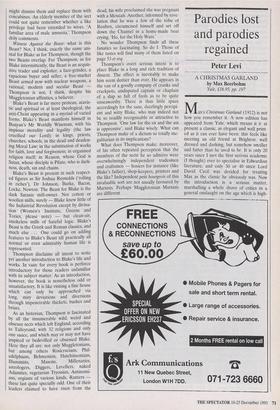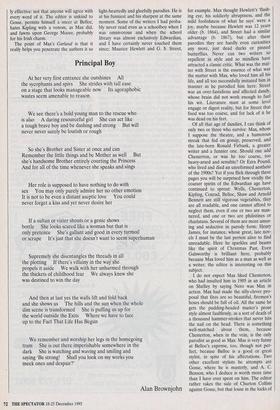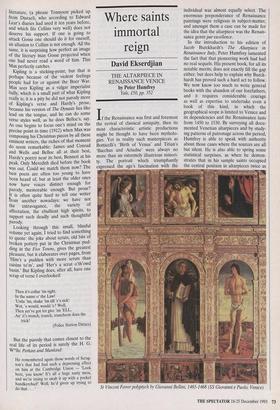Parodies lost and parodies regained
Peter Levi A CHRISTMAS GARLAND by Max Beerbohm Yale, f16.95, pp. 197 Max s Christmas Garland (1912) is not how you remember it. A new edition has appeared from Yale, which means it is at present a classic, as elegant and well print- ed as it can ever have been. this feels like meeting an old friend at Brighton. well dressed and dashing, but somehow smaller and fatter than he used to be. It is only 20 years since I met the first serious academic (I thought) ever to specialise in Edwardian literature, and only 30 or 40 since Lord David Cecil was derided for treating Max as the classic he obviously was. Now the introduction is a serious matter, marshalling a whole drove of critics in a general onslaught on the age which is high-
ly effective: not that anyone will agree with every word of it. The editor is unkind to Gosse, permits himself a sneer at Belloc, hates Kipling with a venom, as Max did, and fawns upon George Moore, probably for his Irish charm.
The point of Max's Garland is that it really helps you penetrate the authors it so
light-heartedly and gleefully parodies. He is at his funniest and his sharpest at the same moment. Some of the writers I had proba- bly never read even as a schoolboy when I was omnivorous and when the school library was almost exclusively Edwardian, and I have certainly never touched them since; Maurice Hewlett and G. S. Street,
for example. Max thought Hewlett's 'flash- ing eye, his soldierly abruptness, and the mild foolishness of what he says' were a joy, maybe because Hewlett was 12 years older (b. 1864), and Street had a similar advantage (b. 1867), but after these parodies they are hardly even curiosities any more, just dead ducks or pinned butterflies. Never can two writers so repellent in style and so mindless have attracted a classic critic. What was the mat- ter with Street is the essence of what was the matter with Max, who loved him all his life, and all too successfully imitated him in manner as he parodied him here: Street was an over-fastidious and affected dandy, whose brain did not work enough to fuel his wit. Literature must at some level engage or digest reality, but for Street that food was too coarse, and for lack of it he was dead on his feet.
Of all that age of dandies, I can think of only two or three who survive: Max, whom I suppose the theatre, and a humorous streak that fed on gossip, preserved, and the late-born Ronald Firbank, a greater writer and a funnier one. Should one add Chesterton, or was he too coarse, too heavy-arsed and sensible? Or Ezra Pound, who lived and died an unreformed aesthete of the 1900s? Yet if you flick through these pages you will be surprised how vividly the coarser spirits of the Edwardian age have continued to sprout: Wells, Chesterton, Kipling, Conrad, Belloc, Shaw and Arnold Bennett are still vigorous vegetables, they are all readable, and one cannot afford to neglect them, even if one or two are man- nered, and one or two are philistines or charlatans. Several of them are more amus- ing and seductive in parody form: Henry James, for instance, whose great, late nov- els I must be the last person alive to find unreadable. Here he sparkles and beams like the spirit of Christmas Past. Even Galsworthy is brilliant here, probably because Max loved him as a man as well as a writer; the editor is interesting on this subject.
I do not expect Max liked Chesterton, who had insulted him in 1905 in an article on Shelley by saying Nero was Max in action. Max had made the silly-clever pro- posal that fires are so beautiful, firemen's hoses should be full of oil. All the same he gets the pudding-headed master's prose style almost faultlessly, as a sort of death of a thousand hammer-strokes that never hits the nail on the head. There is something well-matched about them, because Chesterton, when in the vein, is the only parodist as good as Max. Max is very funny at Belloc's expense, too, though not per- fect, because Belloc is a good or great stylist, in spite of his affectations. Two other excellent stylists he attempts are Gosse, where he is masterly, and A. C. Benson, who I deduce is worth more time than I have ever spent on him. The editor rather takes the side of Churton Collins against Gosse, but that louse in the locks of literature, (a phrase Tennyson picked up from Disraeli, who according to Edward Lear's diaries had used it ten years before, and which fits Collins very well) does not deserve his support. If one is going to attack Gosse one should do it for oneself, an allusion to Collins is not enough. All the same; it is surprising how perfect an image of the literary man Gosse projected when one had never read a word of him. This Max perfectly catches.
Kipling is a sticking-point, but that is perhaps because of the violent feelings people had for or against the Boer War. Max sees Kipling as a vulgar imperialist bully, which is a small part of what Kipling really is; it is a pity he did not parody more of Kipling's verse and Hardy's prose, because his version of The Dynasts lies like lead on the tongue, and he can do some verse styles well, as he does Belloc's, say. As one begins to focus one's mind on the precise point in time (1912) when Max was composing his Christmas pieces by all these eminent writers, the riches of that moment do seem remarkable: James and Conrad and Wells and Belloc all at their best, Hardy's poetry near its best, Bennett at his peak. Only Meredith died before the book was out. Could we match them now? The best poets are often too young to have been heard of, but at least the older ones now have voices distinct enough for parody, memorable enough. But prose? It is often quite hard to tell one writer prom another nowadays; we have not the extravagance, the variety of affectation, the ebullient high spirits, to support such deadly and such thoughtful parody. Looking through this small, blissful volume yet again, I tried to find something to quote: the joke about scruts, old bits of broken pottery put in the Christmas pud- ding in the Five Towns, gives the greatest pleasure, but it elaborates over pages, from `Him's a pudden with more scruts than raisins to'm', and `tier's a strut o'th'owd basin.' But Kipling does, after all, have one scrap of verse I overlooked:
Then it's collar 'im tight, In the name o' the Law!
'Ustle 'im, shake 'im till 'e's sick!
Wot, 'e would, would 'e? Well, Then yer've got ter give 'im 'ELL, An' it's trunch, trunch, truncheon does the trick! (Police Station Ditties)
But the parody that comes closest to the real life of its period is surely the H. G. W*Ils: Perkins and Mankind:
He remembered again those words of Scrag- son's that had had such a depressing effect on him at the Cambridge Union — 'Look here, you know! It's all a huge nasty mess, and we're trying to swab it up with a pocket handkerchief! Well, he'd given up trying to do that . . . '












































































































 Previous page
Previous page